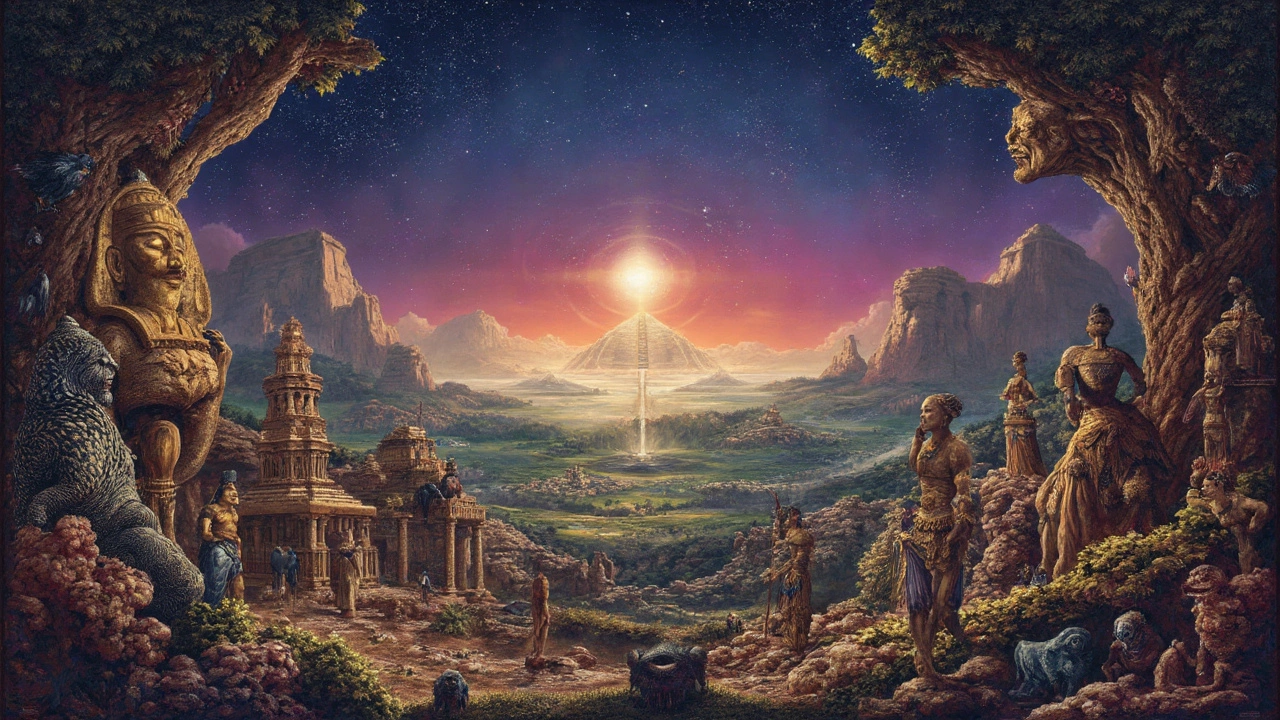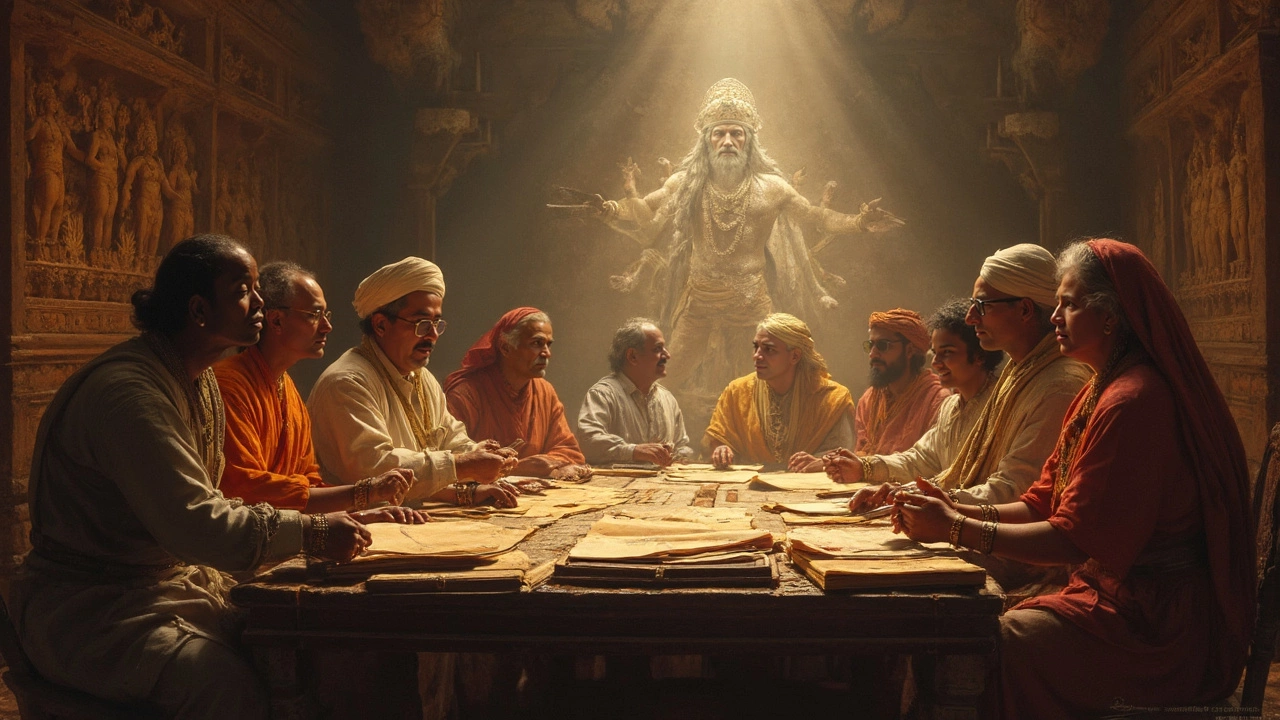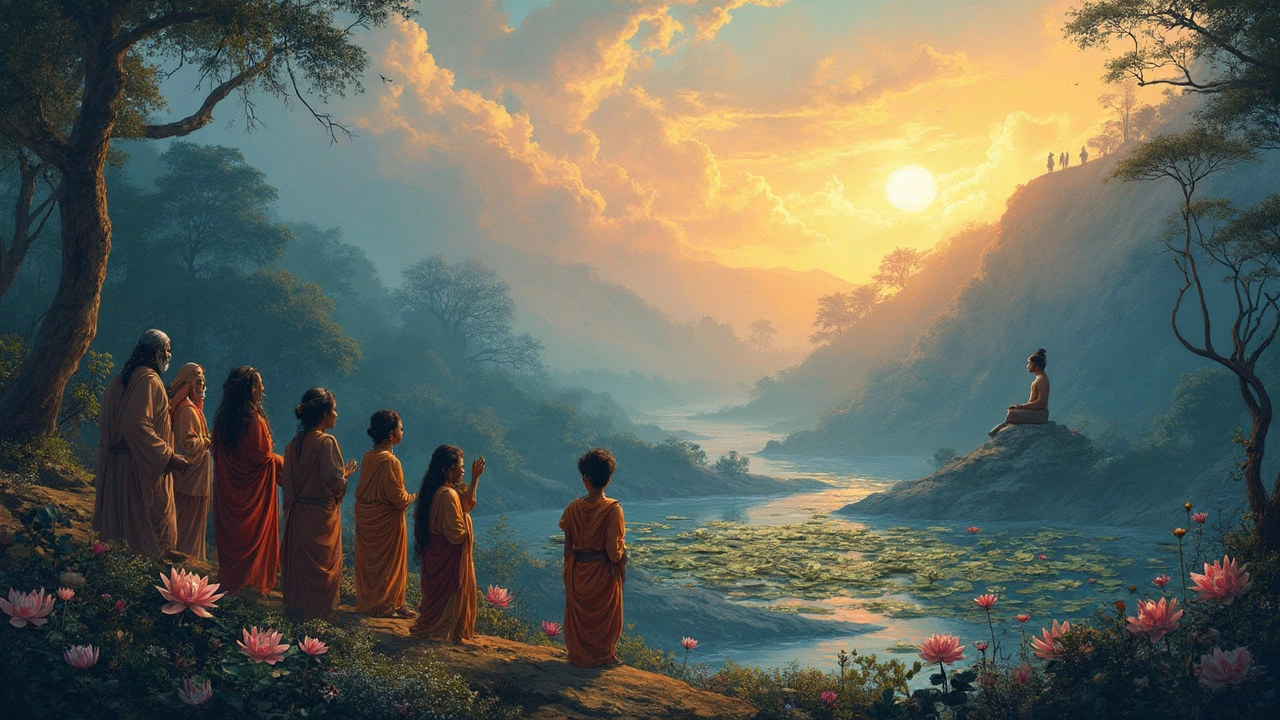Is There a God or Not? Exploring Beliefs Through Historical Fiction
 Mar, 22 2025
Mar, 22 2025
Is there a God? It’s one of those questions that’s been around since the dawn of time, don't you think? Everyone's got an opinion on it, from ancient shamans to today's tech geeks. Stories of gods and the divine are scattered through history like clues in a treasure hunt.
In ancient times, belief in gods was as common as breathing. Folks couldn't quite explain thunder or crop failures, so gods were an easy answer. And let's not forget the Greeks with their pantheon of party-loving gods or the Egyptians who built massive temples to honor their deities. Interesting how people always tailored their gods to fit the world they knew.
- Ancient Beliefs Unveiled
- The Middle Ages Mysticism
- The Enlightenment: Questioning the Divine
- Modern Perspectives
- Personal Reflections
Ancient Beliefs Unveiled
The quest to understand if there's a God has roots that go way back into ancient history. Imagine you're an ancient Egyptian, and you see the sun rising every day without fail. You might start thinking there's a divine power making that happen. Egyptians had Ra, the sun god, who they believed rode his chariot across the sky.
Then there's Mesopotamia, often credited as one of the birthplaces of civilization. Here, the people worshipped a plethora of gods, each playing a role in their everyday lives. An interesting tidbit is Hammurabi’s Code, one of the earliest written laws that claimed divine legitimation, underlining how belief in deities was intertwined with governance and social justice.
Ancient Greece and Gods
The Greeks took it to another level with their pantheon of gods, each with distinct personalities. Ever heard of Zeus, king of the gods, strong and often too quick with his thunderbolt? He was the boss of Mount Olympus. These stories were more than just entertainment; they were explanations of the world around them.
What’s fascinating is how these beliefs were passed down. Oral traditions, carvings, pottery, and even epic poems like Homer’s Iliad and Odyssey – all served to strengthen the presence of these beliefs. Just imagine the communal gatherings around a fire, sharing tales of heroes and gods.
India and Its Diverse Pantheon
In India, things were quite different but equally interesting. The Vedas, ancient texts dating back thousands of years, spoke of a single universal spirit – but also a myriad of gods representing different aspects of life and nature. Hinduism, one of the major religions today, finds its roots here, going strong with stories of gods like Vishnu, Shiva, and Brahma.
These ancient societies leaned on their beliefs to tackle life's uncertainties, crafting stories and myths that resonated with their people. It's like they saw the limitless universe and needed something to hold onto, and so they found solace in their deities.
The Middle Ages Mysticism
The Middle Ages was a wild time for religion and belief in God, with mysticism being the flavor of the day. You had your monks and nuns seeking divine visions and putting a lot of faith in the unexplainable. Wow, was it a mix of faith, fear, and sometimes pure showmanship.
One famous mystic from this time was Hildegard of Bingen. She was a nun who experienced vivid visions she believed were from God. Her accounts mixed religious instruction with musical genius—talk about a total boss!
Monastic Life and Mysteries
The monasteries were buzzing with mystical experiences. Monks and nuns sought to connect with the divine through hardcore meditation, prayer, and sometimes fasting. They tried to make sense of the tough medieval world by clinging to the hope that their visions were real messages from heaven.
The Dominicans and Franciscans, two big religious orders back then, encouraged folks to experience God not just through words but by direct, individual spiritual experiences. It was like they wanted to get as close to God as possible without leaving Earth.
The Clash of Ideas
But not everyone bought into the mysticism hype. The Church later began to question these mystical practices. They wanted to draw clear lines about what's acceptable—even burning a few heretics who took things too far. Yikes! It reflects humanity's ongoing quest to answer if there's a God, even at the risk of stepping on toes.
- Relics Galore: People believed relics from saints were super powerful.
- Pilgrimages: These journeys were all about seeking divine favor or forgiveness.
The Middle Ages might seem far out, but it’s a huge puzzle piece in our understanding of God and belief systems. Even today, echoes of those mystical traditions can be felt in spiritual practices around the world.

The Enlightenment: Questioning the Divine
The Enlightenment was a game-changer. It was like someone flipped on the lights in Europe during the 17th and 18th centuries. Suddenly, folks weren’t just accepting things at face value. No more unquestioned belief in a god because the church said so. People started poking around, asking the tough questions, and relying more on reason and evidence.
Take Isaac Newton, for example. The guy was a genius. He came along with his laws of motion and gravitation, which honestly changed how people viewed the universe. Did it mean he completely dismissed God? Not really. Newton believed in a creator but thought the universe was like a well-oiled machine that God set in motion.
The Philosophical Push
Then there were philosophers like Voltaire and Rousseau shaking things up. Voltaire was known for his sharp wit and didn’t mind criticizing organized religion. He wasn’t anti-God; he was more about bashing how religion was used to control people. His question was straightforward: If there is a god, why all this suffering and injustice?
Rousseau had a unique spin. He believed in a natural religion—straightforward connection with the divine without all the church baggage. He emphasized personal spirituality over dogma, which appealed to those fed up with rigid religious practices.
Stats and Numbers
If you need some numbers, by the end of the Enlightenment, around 20% of intellectuals were deists, meaning they believed God created the world but didn’t interfere in it. It was like believing in a cosmic clockmaker who left the clock to tick on its own.
The ideas that bubbled up during the Enlightenment shifted the way people approached faith. It wasn't about dismissing the divine outright but about using reason to find one's own path in understanding the universe.
Modern Perspectives
Fast forward to today, and the question of whether there is a God is as complex as ever. We've got science, technology, and a global network that lets us ponder the universe from our living rooms, yet the debate is still on. Modern times have given rise to a whole spectrum of beliefs from staunch atheism to fervent faith, blending tradition with contemporary thought.
In the world of science, many look to the cosmos for answers. Think about the Enlightenment, where questioning the divine took center stage. Folks like Carl Sagan and Stephen Hawking didn’t believe in God per se, but they sure did talk about humanity's place in the universe, adding to the dialogue on religious belief.
Science and Religion: Friends or Foes?
These days, some scientists are seeing connections between their work and belief systems. For example, the multiverse theory posits there are infinite universes with various outcomes. Interestingly, it's not too different from some spiritual notions that multiple realities exist beyond our perception.
On the flip side, spirituality isn't shy about evolving either. New spiritual movements often blend traditions with modern science, like quantum mysticism or eco-spirituality, emphasizing earthly connections. Whether it’s through meditation apps or podcasts on religious philosophy, modern tools shape spiritual journeys in ways our ancestors could only dream of.
Statistics on Belief
Check this out: According to a recent Pew Research study, belief in god or a universal spirit is still held by about 84% of the world's population. Yet, in many Western countries, there is a noticeable surge in those identifying as 'nones,' people who don't affiliate with any religious tradition. Let's take a quick peek at some data:
| Region | Percentage Believing in God | Percentage of 'Nones' |
|---|---|---|
| USA | 56% | 28% |
| Western Europe | 48% | 51% |
| Africa | 95% | 2% |
In today's digital age, folks have more resources than ever for diving into these big questions. Forums, online groups, and even virtual reality experiences offer unique perspectives on humanity's big spiritual quest. It’s a fascinating mix of old and new, blending timeless questions with tech-savvy exploration.

Personal Reflections
So, when it comes to belief in a God, how do we make sense of it today? Well, it's no secret that modern life has thrown heaps of complexity into the mix. Technology, science, and the fast-paced nature of life often leave little room for pondering big existential questions. Yet, that doesn't stop folks from contemplating their faith—or lack thereof.
Interestingly, surveys suggest that about 84% of the world's population identifies with some sort of religious belief. That’s a lot of people who, in one way or another, grapple with the concept of a higher power. Whether you're sitting in a suburban coffee shop or walking through a bustling city, you’re likely surrounded by people with varying beliefs about God.
Personal Journeys
When it comes to personal belief, everyone's journey is unique. Some folks grow up steeped in religious traditions and find them comforting, while others might drift away, seeking different truths. For instance, my daughter Keira often asks me about what I believe. It's these curious questions from our kids that sometimes shake up our own reflections.
It’s not just about religion, though. Some people connect with a sense of spirituality through nature, art, or even meditation. They may not define it as traditional religion, yet they cherish that spiritual connection just the same.
Science and Spirituality
In today's world, science and spirituality sometimes collide head-on. While scientific breakthroughs offer explanations for many mysteries of the universe, they don’t answer everything. For some, this wonder is a gateway to faith, not a roadblock.
A Pew Research survey found that 30% of scientists in the U.S. believe in a 'God,' which might surprise folks. Scientists are just as human as the rest of us, with their own family stories, challenges, and personal reflections.
Ultimately, whether or not there's a God might not be something we can conclusively prove. But this question opens the door to fascinating conversations, encourages personal growth, and invites a deeper understanding of human cultures throughout history.